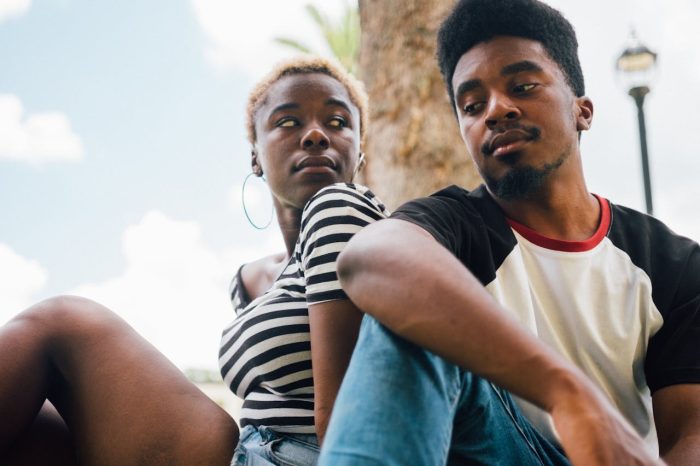
Most of us don’t walk into adulthood thinking, “Wow, my childhood is still running the show.”
If you’ve ever found yourself stuck in the same frustrating relationship patterns, questioning why you push people away or cling too tightly, your past might have more influence on your present than you realize.
The way we were loved (or not loved) as children becomes the foundation for how we navigate love as adults. If we didn’t feel safe, seen, or valued growing up, those wounds don’t just disappear—they follow us into our relationships, quietly shaping the way we connect, communicate, and seek intimacy.
But here’s the good news: awareness changes everything. Once we recognize how our past is affecting our present, we can start the healing process.
The Many Ways Childhood Wounds Show Up in Relationships
1. Fear of Abandonment
If a parent or caregiver were physically or emotionally absent, you might develop an intense fear of being left behind or abandoned. Even as an adult, this can manifest as clinginess, overthinking, or constant worry that your partner will leave—even when there’s no real reason to think so.
You might read too much into delayed texts, over-apologize, or tolerate unhealthy dynamics just to avoid being alone.
2. Avoidance of Intimacy
On the flip side, if love felt unpredictable or overwhelming as a child, you might have learned to keep people at a distance. Maybe deep connection feels too intense, so you find ways to create space—whether that’s by ghosting, shutting down emotionally, or choosing partners who are unavailable.
You might even tell yourself you “just don’t like relationships”—but deep down, it may be more about protecting yourself from potential hurt.
3. People-Pleasing & Over-Apologizing
If love felt conditional growing up—meaning, you had to “earn” affection by being well-behaved, helpful, or agreeable—you might struggle to set boundaries as an adult.
You say yes when you mean no. You shrink yourself to avoid conflict. You feel responsible for other people’s emotions. And you constantly apologize—even when you’ve done nothing wrong.
4. Repeating Unhealthy Patterns
Ever notice how we’re often drawn to people who remind us of our parents? It’s not random. If you had an emotionally distant father, you might unconsciously be attracted to emotionally distant partners. If your mother was overly critical, you might feel oddly “at home” with someone who never makes you feel good enough.
It’s not that we want to repeat old wounds—it’s just that the nervous system seeks out what feels familiar, even when it’s unhealthy.
How to Heal & Break the Cycle
1. Recognize the Pattern
Before you can change anything, you have to see it clearly. Start by noticing your reactions inside your relationships. Do you panic when someone pulls away? Do you struggle to trust even when there’s no reason not to? Recognizing the pattern is the first step toward healing it.
2. Inner Child Work
Your inner child—the younger version of you who didn’t get what they needed—still exists inside you. Take a moment and picture them. What did they need to hear back then?
Maybe it’s:
“You are loved.”
“You don’t have to prove your worth.”
“You don’t have to be perfect to be enough.”
Start speaking to yourself with that same kindness and compassion.
3. Therapy & Self-Reflection
Healing deep wounds isn’t always something we can do alone. Therapy—especially trauma-informed or attachment-focused therapy—can help you unravel old beliefs and rewire your patterns.
Even if therapy isn’t accessible right now, journaling, self-help books, and deep conversations with trusted friends can be powerful tools for self-discovery.
4. Reparent Yourself
Ask yourself: What did I need as a child that I didn’t get?
If you needed comfort, start giving yourself more grace. If you needed encouragement, start celebrating your own wins. If you needed boundaries, practice saying no without guilt.
Become the safe, loving presence you always needed.
5. Choose Differently
Healing doesn’t mean you’ll never be triggered again. It means you’ll have the awareness to make different choices.
Instead of chasing someone who is emotionally unavailable, you’ll recognize the pattern and walk away. Instead of shutting down during conflict, you’ll lean into vulnerability. Instead of fearing love, you’ll learn to trust it.
Our childhood wounds may shape us, but they don’t have to define us forever. Healing is a process, not a destination. The more conscious we become in our relationships, the more we can step out of autopilot and into healthier, more fulfilling connections.
And the most important relationship of all? The one you have with yourself. Because when you heal, you don’t just change your love life—you change your entire life.
 Share on bsky
Share on bsky
This account does not have permission to comment on Elephant Journal.
Contact support with questions.